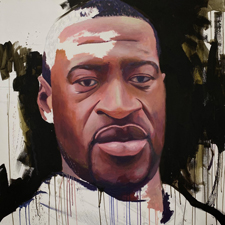Day 164, August 27, 2020
The Blackboard
Tonight's soundtrack: Herbie Hancock, Headhunter II
 Little known fact... all through the pandemic, I've been wearing shorts. For the most part, nobody sees me below laptop level, so while I have a nice button down Zoom shirt, and on a rare (for summer) occasion, worn a tie, down below I've rotated between two or three pairs of shorts chosen for a combination of lightness of material, comfort, and not needing a belt, because who wants to sit at their kitchen table all day wearing a belt?
Little known fact... all through the pandemic, I've been wearing shorts. For the most part, nobody sees me below laptop level, so while I have a nice button down Zoom shirt, and on a rare (for summer) occasion, worn a tie, down below I've rotated between two or three pairs of shorts chosen for a combination of lightness of material, comfort, and not needing a belt, because who wants to sit at their kitchen table all day wearing a belt?
Yesterday, the weather turned and I was chilly all day. Today didn't seem any warmer, so I put on jeans, this pair needs a belt, and shockingly, socks. Midway through the day, I even donned a knit hoodie over my Zoom shirt. I guess it really is late August. The summer has slipped away surprisingly fast. It is a little breathtaking to realize the summer is mostly gone and fall is right around the corner. The semester, for all of its complications and challenges, is starting next week and we'll be off into the rush of classes, projects, reports, committees, and everything else that fills our days. It is a little daunting because it is hard to imagine working more, or with greater volume, than what is happening now, but year after year, for as long as I've worked at the college, we have managed to do just that.
Of course, this year is different. There is tension all around, as there is throughout higher education as we wait to see where our enrollment will end up, how much the decreased tax revenues will impact the state allocation of budgets, whether an entire college can teach online and retain its core spirit, and whether widespread outbreaks of COVID-19 will return with flu season. So there is all that added tension, some of it talked about openly, and some of it an underlying tenor to everything we do.
I spoke to my father earlier today. He's a musician with the Boston Symphony Orchestra, and he talked about the negotiations for a new contract that, of course, were derailed by the pandemic. Musicians the world over have seen tours, and entire seasons cancelled. Almost all performers are in a similar strait.
In education, the start of the fall semester, is the start of a new year. It is a beginning. There is a collective cleaning of the slate, and we start refreshed, with bright new students, maybe a fresh notebook, or at least a fresh page in the grade book. For faculty, there is the nervous anticipation, like any performer returning to the stage after a time away, there is anxiety, but also confidence that things are ready, or at least nearly ready, for things to begin.
Every year faculty get to meet a new cohort of students, get to learn their names, and over time, get to know their students, and in the course of a semester faculty get to know a bit about who their students are as people. As educators, we pride ourselves in knowing our students, being able to asses who we put our faith in, who we think will go far. It is a wonderful thing to see that in a student, to discover that in a student. It is exciting to find someone who is passionate about one's subject. That excitement is a part of what feeds us as educators. If we can facilitate enough of those transcendent moments of discovery, passion, and understanding, then you could pay us in oatmeal, and we would still do what we do. Well, maybe not oatmeal... but you get the idea.
So the trick will be to see if we can keep all those transcendent moments as exciting for the students and the educators throughout the year. I think we can, but it will feel different. Mediated online, it will be more ephemeral, and we will need those moments more often... that's what I predict. The moments themselves will still be fantastic and full of wonder, but we will forget them soon after we step away from the laptop and eat a handful of Asian rice snack, or refill our cup of tea. For both educators and students, we will need to work harder to return day after day and make things exciting again, and discover new ways of doing things that translate better across a screen. This is of course both exciting and daunting.
But it is also really amazing. It is a profound thing to be an educator, to engage in this work. I used to tell people, the truth of the matter was, if you took away all the fancy technology and just gave us a blackboard and a piece of chalk, we would make it work. It is strange to have something like the reverse happen, there is only the technology... no classroom, no hexagonal tables, no cafeteria... can we still make it work? I'm certain we can. Of course it will be harder for some people, some disciplines, but educators are like musicians in that they have always faced adversity with ingenuity. The limitations of a format, of an instrument, of a medium, in turn inspires the ingenuity to transcend what ever limitations there are and create something greater than what seemed possible.
Take care and be well (and do watch the Herbie Hancock, it is an awesome concert!),
Leo
From Our Friends:
From the It Gets Better Project:
Resources for the Black LGBTQ+ Community
Connect with national and local organizations actively working to provide information, resources, and/or services to the Black LGBTQ+ community. You are loved.
From AAAS ARISE:
Centering Equity to Humanize the Process of Coming Back Together
Heading back to school, we are facing not only the COVID-19 pandemic and economic crisis, but also a social crisis.
In his blog and 2020 Noyce Virtual Summit Keynote Address, Dr. David Kirkland discusses how to center joy and justice to promote equity in STEM education.
From the Mass Cultural Council:
From the Five College Center for East Asian Studies:
Asia for Educators (AFE) NCTA New Graphic Novel Book Groups for Fall 2020. Participation is free and Professional Development credit is available.
Black Ships: An Illustrated Japanese History - The Americans Arrive, by Sean Michael Wilson, Illustrated by Akiko Shimojima. September 9-October 6, 2020. In 1853 the arrival of Commodore Perry and four American ships forced Japan to open up to trade. Register Here.
The Satsuma Rebellion: Illustrated Japanese History-The Last Stand of the Samurai, by Sean Michael Wilson, Illustrated by Akiko Shimojima. October 14-November 3. Award-winning authors and illustrators tell the riveting story that changed the face of modern Japan. Register Here.
Banned Book Club, by Kim Hun Sook & Ryan Estrada, Illustrated by Ko Hyung-Ju. November 18-December 22. Hyun Sook shares her dramatic true story of political strife, fear-mongering, the death of democratic institutions, and the relentless rebellion of reading. Register Here.
From the Augusta Savage Gallery at UMass:
From Pearson:
Unwritten webinar series: Join expert authors and student host Jaylen Brown of the University of Central Florida as they discuss the history of systemic racism.
From UMass' Arts Extension Services:
From Academic Impressions:
Written by Myron R. Anderson and Kathryn S. Young
Microaggressions, microbullying, and bullying are the silent destroyers of a university’s climate.
Similar to high blood pressure, these behaviors appear difficult to detect, but if undetected and untreated, they can destroy relationships and morale, and reduce collaboration, productivity, and a sense of belonging at your institution. So how do you prevent (or clean up) a toxic environment in your unit, department, or campus?
In this handbook, two leading experts on hierarchical microaggressions present in-depth scenarios, strategies, and worksheets for addressing these issues on your campus.
From 18 Million Rising:
Today's Online Teaching Tips:
From Jenzabar Webinars:
From Higher Ed Jobs:
by Russell S. Thacker
 We don't always get a second chance. But this fall, if you are teaching at one of the increasing number of institutions around the United States opting back into online learning, you are eligible for a do-over. With pandemic online learning 2.0 fast approaching, how will you update your next version of online teaching? Here are a few small changes you can make for a more engaging and personal online learning experience.
We don't always get a second chance. But this fall, if you are teaching at one of the increasing number of institutions around the United States opting back into online learning, you are eligible for a do-over. With pandemic online learning 2.0 fast approaching, how will you update your next version of online teaching? Here are a few small changes you can make for a more engaging and personal online learning experience.






Comments
Post a Comment